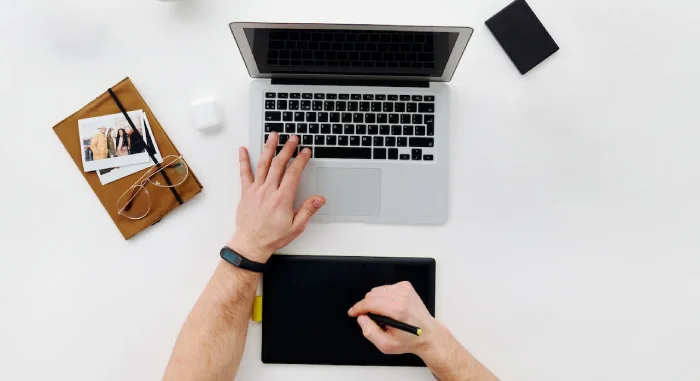In today’s digital age, having a portable computing device is essential for both work and personal use. While laptops have been a staple for years, tablets have gained popularity for their compact design and versatility. When it comes to deciding between a laptop and a tablet, the choice largely depends on your specific needs, profession, and personal preferences. In this comprehensive blog, we’ll explore the key differences between laptops and tablets and help you determine which device is suitable for various professions.
Laptops: Power and Productivity
Laptops have long been the go-to choice for professionals and students due to their computing power, versatility, and functionality. Here are some of the advantages of using a laptop:
1. Processing Power: Laptops typically offer more processing power than tablets, making them ideal for tasks that require heavy computing, such as video editing, 3D modeling, and software development. They can handle multitasking efficiently and run resource-intensive applications with ease.
2. Larger Display: Laptops come with larger screens, which are better for tasks that involve detailed work, like graphic design, coding, or data analysis. A larger display provides more screen real estate, making it easier to work on complex projects.
3. Keyboard and Mouse: Most laptops come with a physical keyboard and touchpad or trackpad. These input methods are essential for typing long documents, working in spreadsheets, and precise cursor control, which can be cumbersome on a touchscreen.
4. Full Operating Systems: Laptops run full-fledged operating systems (e.g., Windows, macOS, Linux), enabling you to install and use a wide range of software and applications for professional work, including specialized industry software.
5. Storage and Connectivity: Laptops often offer more storage capacity and a wider range of ports for connecting peripherals and accessories, which is crucial for professionals who rely on external devices like external hard drives, monitors, or printers.
Tablets: Portability and Convenience
Tablets have surged in popularity for their portability and user-friendly interface. They are a great choice for certain professions and scenarios, thanks to the following advantages:
1. Portability: Tablets are incredibly lightweight and compact, making them ideal for on-the-go professionals, such as sales representatives, field researchers, and journalists. Their small form factor allows you to carry them easily in a bag or even a large pocket.
2. Touchscreen and Pen Input: Tablets have touchscreens that support stylus or pen input. This makes them excellent for tasks that involve sketching, note-taking, or graphic design. Professionals in creative fields, like artists and designers, often prefer tablets for their natural drawing capabilities.
3. Long Battery Life: Tablets typically have longer battery life than laptops, making them suitable for professions that require extended use without easy access to power sources. This includes outdoor work or long meetings and presentations.
4. App Ecosystem: Tablets run mobile operating systems like Android and iOS, which have vast app stores with a wide range of productivity, creativity, and entertainment apps. These are great for tasks like note-taking, document editing, and communication.
5. Multimedia and Entertainment: Tablets are fantastic for consuming media, whether it’s reading e-books, watching videos, or browsing the web. They are also popular among professionals who need to showcase their work in a visually appealing manner, such as photographers and architects.
Which Device is Suitable for Which Profession?
Now that we’ve discussed the key differences between laptops and tablets and how they cater to various needs, let’s dive deeper into the specific professions and scenarios where each device shines. Choosing the right device for your profession can significantly enhance your productivity and workflow.
1. Creative Professionals:
Suitable Device: Tablets (with stylus support)
Professions: Artists, graphic designers, illustrators, photographers
Why: Creative professionals often require precise, natural drawing and sketching capabilities. Tablets with stylus support offer an intuitive way to express their artistic vision. The touch-sensitive screens and pressure sensitivity of stylus pens make them ideal for digital drawing and design work.
2. Mobile Workforce:
Suitable Device: Tablets
Professions: Sales representatives, field researchers, healthcare workers, delivery drivers
Why: Professionals who are constantly on the move benefit from the portability of tablets. They can easily carry these lightweight devices to meetings, appointments, or job sites. Tablets are perfect for note-taking, accessing client information, and staying connected while on the go.
3. High Processing Needs:
Suitable Device: Laptops
Professions: Video editors, architects, software developers, data scientists
Why: Jobs that demand substantial computing power and multitasking capabilities, such as video editing or 3D modeling, are best served by laptops. Laptops can handle resource-intensive applications and complex tasks efficiently.
4. Presentations and Multimedia Display:
Suitable Device: Tablets (with compatible accessories)
Professions: Event planners, public speakers, photographers
Why: Tablets are excellent for presenting content in a visually appealing manner. With accessories like wireless projectors or screen mirroring, tablets can be used to create engaging presentations and showcase multimedia content.
5. Office and Administrative Work:
Suitable Device: Laptops
Professions: Accountants, administrative assistants, data entry specialists, content writers
Why: Office-related tasks often involve extended typing and spreadsheet work, making a physical keyboard and larger display crucial. Laptops provide the necessary tools for efficiency in these roles.
6. Professions Requiring Long Battery Life:
Suitable Device: Tablets
Professions: Outdoor photographers, field researchers, event coordinators
Why: Jobs that take you away from power sources for extended periods benefit from the long battery life of tablets. Whether you’re capturing moments in the great outdoors or conducting research in remote locations, tablets can keep you connected and productive.
7. Students and General Use:
Suitable Device: Depends on individual needs and preferences.
Considerations: Students and general users should choose based on their usage patterns. A laptop may be preferred for extensive typing and research tasks, while a tablet might be more convenient for note-taking and casual web browsing.
In conclusion, the choice between a laptop and a tablet largely depends on your profession and specific requirements. Consider the nature of your work, your need for processing power, and your preference for input methods when making your decision. Some professionals may find it advantageous to have both devices to cover a wide range of tasks effectively. Ultimately, the right device is the one that complements your work and lifestyle, helping you achieve your goals efficiently.



